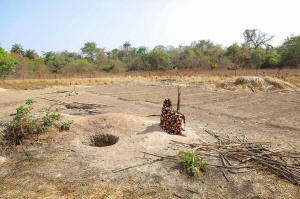Ivory Coast is losing US aid as al-Qaida and other extremist groups are
approaching
[March 17, 2025]
By MONIKA PRONCZUK and MISPER APAWU
KIMBIRILA-NORD, Ivory Coast (AP) — With its tomato patches and grazing
cattle, the Ivory Coast village of Kimbirila-Nord hardly looks like a
front line of the global fight against extremism. But after jihadis
attacked a nearby community in Mali five years ago and set up a base in
a forest straddling the border, the U.S. committed to spending $20
million to counter the spread of al-Qaida and the Islamic State group
here and in dozens of other villages.
The Trump administration's sweeping foreign aid cuts mean that support
is now gone, even as violence in Mali and other countries in the Sahel
region south of the Sahara has reached record levels and sent tens of
thousands refugees streaming into northern Ivory Coast.
Locals worry they have been abandoned. Diplomats and aid officials said
the termination of aid jeopardizes counterterrorism efforts and weakens
U.S. influence in a part of the world where some countries have turned
to Russian mercenaries for help.
In Kimbirila-Nord, U.S. funding, among other things, helped young people
get job training, built parks for cattle to graze so they are no longer
stolen by jihadis on Malian territory, and helped establish an
information-sharing system so residents can flag violent encounters to
each other and state services.
“What attracts young people to extremists is poverty and hunger,” said
Yacouba Doumbia, 78-year-old chief of Kimbirila-Nord. “There was a very
dangerous moment in 2020. The project came at the right time, and
allowed us to protect ourselves.”
“Seize a narrow prevention window”
Over the last decade, West Africa has been shaken by extremist uprisings
and military coups. Groups linked to al-Qaida and the Islamic State
group have conquered large areas and killed thousands in the Sahel and
have been spreading into wealthier West African coastal states, such as
Ivory Coast, Benin and Togo.

In 2019, President Donald Trump signed the Global Fragility Act that led
to the initiatives in northern Ivory Coast. The U.S. goal in this area
was to “seize a narrowing prevention window,” according to this year’s
congressional report about the implementation of the bipartisan
legislation.
Experts say local concerns help drive the popularity of extremist
groups: competition for land and resources, exclusion, marginalization
and lack of economic opportunities. Across the region, Islamic
extremists have recruited among groups marginalized and neglected by
central governments.
“Ivory Coast is one of the few countries that still resist the terrorist
threat in the Sahel,” said a U.N. official working in the country who
was not authorized to speak on the matter publicly. “If we do not
continue to support border communities, a minor issue could send them
into the arms of extremists.”
Trump issued an executive order in January directing a freeze on foreign
assistance and a review of all U.S. aid and development work abroad. He
charged that much of foreign aid was wasteful and advanced a liberal
agenda.
“Everyone was just looking out for themselves”
In 2020, when the jihadis struck a Malian village 10 kilometers (6
miles) away, Kimbirila-Nord in many ways fit the description of a
community susceptible to extremism.
The lives of Malians and Ivorians were intertwined. People crossed the
border freely, making it easy for extremists, who like residents spoke
Bambara, to access Kimbirila-Nord. Many residents did not have identity
cards and few spoke French, leaving them with no access to states
services or official information. Different ethnic groups lived next to
each other but were divided by conflicts over scarce natural resources
and suspicions toward the state. And young people did not have
opportunities to make money.
“We were very scared” when the extremists attacked, said Aminata Doumbia,
the head of the village's female farmers cooperative. “Everyone was just
looking out for themselves.”

[to top of second column]
|

Aminata Doumbia, president of the women's group, sits next to a pit
on farmland that was leased with help from USAID but has not yet
been cultivated because the funding has ceased in Kimbirila-Nord,
Ivory Coast, Feb. 21, 2025. (AP Photo/Misper Apawu)

The Ivorian government runs a program that provides professional
training, grants and microloans. But access is difficult in villages
such as Kimbirila-Nord.
Kimbirila-Nord is home to refugees from Mali, Burkina Faso and
Guinea. Sifata Berte, 23, fled there with his family two years ago
from Mali. He is not eligible for the government-run program, but
got training through the project funded by the U.S. Agency for
International Development and now works as an apprentice in an iron
workshop.
Other things the USAID-funded project set up included a network of
community radios in local languages, so people could get access to
information. It also used mobile government trucks to help tens of
thousands of people across the region get their identity documents.
And it brought people together with microcredit cooperatives and
with a special committee of ranchers and farmers that helps resolve
tensions over land.
“It’s thanks to the project that we can sleep at night,” Doumbia,
the village chief, said. “We learned how to be together.”
Equal Access International, an international nonprofit, designed and
implemented the U.S.-funded project.
The USAID project also has been the only direct source of
information on the ground in northern Ivory Coast on violent events
for the U.S.-based Armed Conflict and Location & Event Data Project,
the main provider of data on violence in the Sahel.
The village had big plans
Ivory Coast became known as a target for extremists in 2016, when an
attack on the seaside resort of Grand Bassam killed tourists. In
2021, a string of attacks occurred near the country's northern
border, but the violence has been largely contained after Ivorian
authorities, Western governments and aid groups rushed into this
impoverished and isolated part of the country with military build up
and development projects.
In 2024, the U.S. Africa Command provided over $65 million to
projects in Ivory Coast, most of which "focused on counterterrorism
and border security" in the northern part of the country, according
to the group's website. The Pentagon said in a statement that it was
“not aware of any budget cuts that have undermined counterterrorism
training or partnership programs in Africa.”

Ivory Coast has the second-highest GDP per capita in West Africa,
but according to the U.N. it remains one of the world’s least
developed countries. Many in remote villages like Kimbirila-Nord do
not have access to running water.
“At first we thought that we only had to solve these problems with a
military solution,” Famy Rene, the prefect of Korhogo, the region’s
capital, said. “But we saw that this was not enough. We had to put
in place programs that strengthen the resilience of the population.”
Residents of Kimbirila-Nord had big plans before the U.S. froze aid.
The U.S. was supposed to finance the first well in the village, help
create a collective farm, and expand vocational training,
Now they fear they have been left alone to deal with extremists.
“If you forget, they will come back,” said Doumbia, the village
chief. “As long as there is war on the other side of the border, we
must remain on a high alert.”
All contents © copyright 2025 Associated Press. All rights reserved |